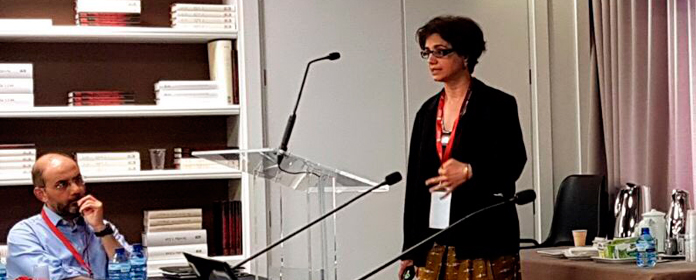"There is no solid basis for arguing that electoral competition disciplines incumbents"
Amrita Dhillon, from King's College London, participated in a conference on development economics organized by the NCID and the Ramón Areces Foundation

FOTO: Alberto Cendoya
“There is no solid basis on which to trust that electoral completion serves to impose discipline on incumbents," or so argued Amrita Dhillon, a professor of economics at King’s College London (UK). She was one of the speakers at a conference on development economics organized by the Navarra Center for International Development (NCID) at the University of Navarra and the Ramón Areces Foundation.
For the expert, in developing countries with weak institutions, after elections citizens expect the establishment of "rules to account for and reduce bad practices." However, she indicated that, with the election- or re-election- of corrupt candidates, this never happens.
At the workshop, she presented a paper on this topic, concluding that electoral discipline may be ineffective in reducing corruption when competition between politicians is too high or too low. In order to study this, she analyzed data gathered on audit findings from a large public program in Indian villages belonging to the state of Andhra Pradesh during 2006-10 and on elections to the village council headship in 2006.
According to the study, corruption has a U-shaped relationship in electoral competition: corruption lessens with intermediate levels of competition. When there is little competition "sitting incumbents can get away with high levels of corruption and still get elected because voters care about another dimension (such as ethnicity or ideology) that the incumbent has and challengers do not." On the other hand, if the competition is too intense, candidates no longer have incentives to behave themselves in office because the chances that they are kicked out are no longer connected to the effort they put in to delivering public goods.”
She also explained that the level of corruption often depends on "whether fraud comes from public or private sphere" and that discipline works best when public spending in question directly affects the voters.
An electronic voting system to prevent fraudThe researcher also referred to a new project she is working on with the Department of Computer Science at King's College to design an electronic voting system that prevents fraud and bribery. "Fraud in electronic voting systems relies on having people manning the machines who can be bribed," she noted. Using bitcoin technology, a completely decentralized electronic voting system will be developed in which a mediator is not necessary.
Amrita Dhillon shared these remarks at the sixth edition of the NCID Research Workshop, an annual international meeting on development economics for professionals, academics and postgraduate students. It was organized by the Navarra Center for International Development, which is part of the Institute for Culture and Society at the University of Navarra. The workshop was organized this year in collaboration with the Ramón Areces Foundation.
